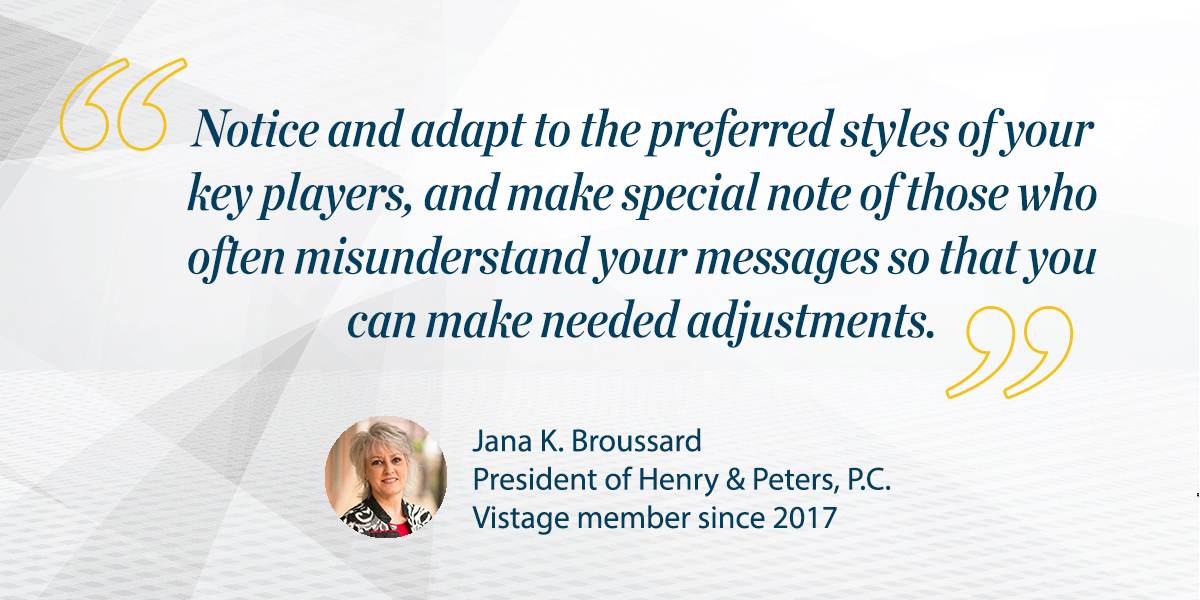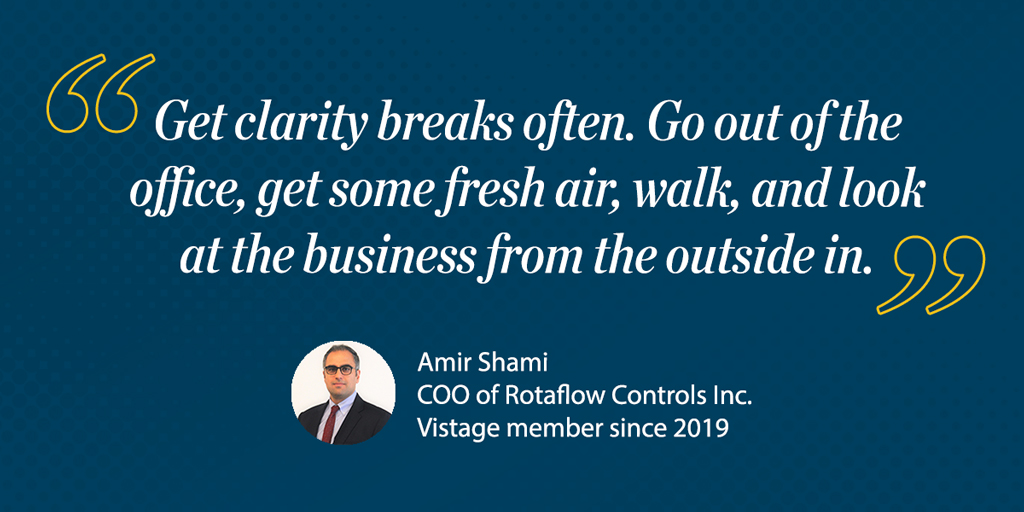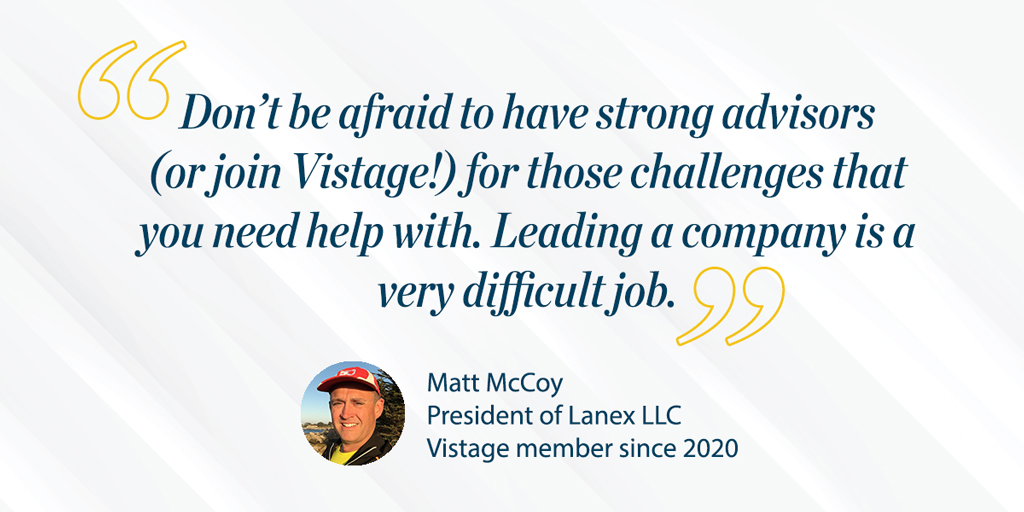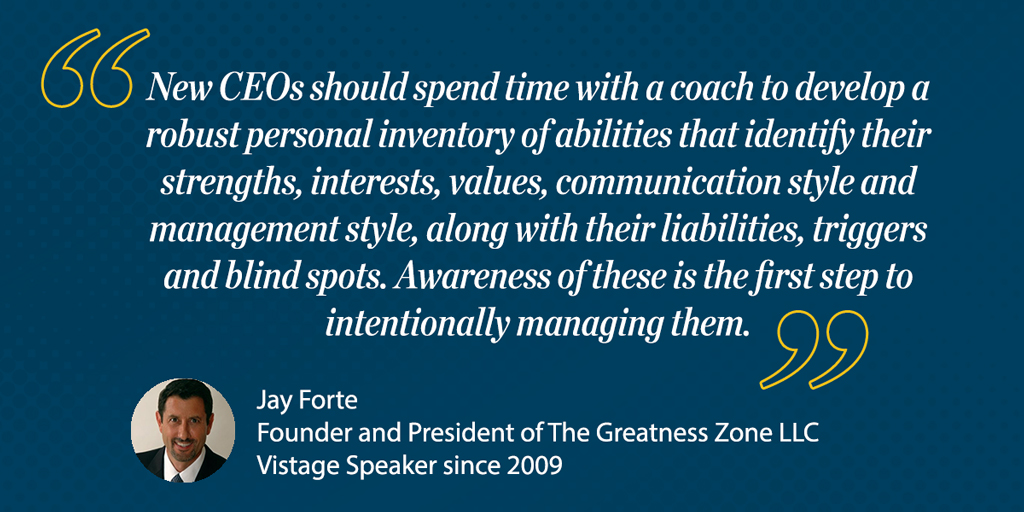8 business leaders give their best pieces of advice for new CEOs

Taking on the role of CEO for the first time can be exhilarating and daunting, especially as various teams vie for priority and resources. The advice for new CEOs below comes from Vistage members and seasoned executive coaches in our community who are deeply familiar with the exciting and challenging step you are taking into your company’s leading role.
The responses from our eight CEOs, business leaders and executive coaches focus on the importance of surveying the state of the business before implementing changes, leading through influence and not by authority, communicating often and effectively with employees, having trusted confidants, and taking time to address personal well-being, from growing self-awareness to taking care of one’s physical and mental health.
Very few take on the role of chief executive. It is inherently a difficult, overwhelming, demanding, rewarding and fulfilling job. New CEOs can benefit greatly from the collective wisdom of those who have been in their shoes. Here are the insightful words of those who have walked the leadership road.
1. Make sure changes you make drive your biggest goals
Connie Miller, President/CEO, Icon Credit Union, Vistage member since 2013:
“Everyone will be approaching you for the change they have ideas about. Create a parking lot for them, and prioritize them later. Also, not everything needs to be changed immediately. Change as little as possible until you have ample time to visit with everyone about what they see as your strengths and weaknesses. If you make a change, make sure it is going to drive your biggest goal.”

2. Commit to being a positive influence
Jana K. Broussard, President, Henry & Peters, P.C., Vistage member since 2017:
“Regardless of the circumstances, the title automatically puts you in the spotlight, so everyone is watching and listening. There will be those who support your position and those who don’t, but you have the opportunity to influence all of them, so commit to being a positive influence, and let the power come through influence more than through defined authority.
Also, no matter how strong our communication skills may be, everyone interprets through their own unique filters, so we must communicate in a variety of ways to have any chance of making ourselves understood by the majority of people. Use multiple types of communication and a variety of message styles. Notice and adapt to the preferred styles of your key players, and make special note of those who often misunderstand your messages so that you can make needed adjustments.”

3. Understand your company’s financials very well
Amir Shami, Chief Operating Officer, Rotaflow Controls Inc., Vistage member since 2019:
“Read ‘The First 90 Days’ book, twice!
Make sure you have a good handle on the company’s financial package, and understand it very well. Especially watch the cash flow carefully. Make sure you have a good corporate lawyer. Check all the contracts with her and don’t rush on signing contracts and showing off your power. Don’t say yes too quickly. If you are not sure and under pressure to make a decision, ask for time to review and get back.
Start reviewing the departments’ processes and understand them before making changes. If you are going to make organizational changes, make sure you are checking your decisions with a senior HR advisor before rolling it out.
Get clarity breaks often. Go out of the office, get some fresh air, walk, and look at the business from the outside in.
If you don’t have a gym membership, get one, and keep going. It will help you manage your stress level and your overall mental health. Make sure you get good sleep, a minimum of 7.5 hours. Do some meditation, every day — ‘Me Time’ helps to organize your mind.”

4. Don’t be afraid of strong advisors
Matt McCoy, President, Lanex LLC, Vistage member since 2020:
“We are a smaller company — 13 people — but I love seeing a line of cars in the parking lot that belong to our employees, and see people having kids, buying houses, and living their lives.
Don’t be afraid to have strong advisors (or join Vistage!) for those challenges that you need help with. Leading a company is a very difficult job.
I look at terminations as a “justice” issue. In a sense, if someone isn’t doing their work properly (i.e., poor quality, misses deadlines, isn’t coachable), it puts an undue burden on the business, the coworkers, the owners and their families, and the employee themselves. Having someone in a job they aren’t suited for isn’t fair to anyone.
Stay out of debt, but learn what is good debt versus bad debt. Don’t take a project on that doesn’t feel right because you might need the work at the moment. Gut feelings for me are often correct, and you have to know when to stretch your abilities and when to take a pass.
Don’t be afraid to fire a bad client. Not all clients are “good” clients just because they spend money with you and maybe even profitable. Try to avoid snap decisions. Often if you let an issue marinate, the elements of the problem will become clearer and you will have better direction when finalizing your decision.
As CEO, you’re the face of the business. It can be hard sometimes for people who tend to be shy or introverts to self-promote. Remember that you reached your position and you’re (presumably) good at what you do. Don’t be afraid to promote yourself and your business even if it feels uncomfortable at times.
Don’t do things you don’t want to do that you’re capable of delegating. Your time is the most valuable in the company, typically, so focus on the issues that only you can deal with.”
5. Connect to the mission
Jane Owen, CEO/President, Owner and Vistage Chair since 2017:
“When I stepped into our family business I didn’t feel connected to what was being done, implemented or led prior. I needed to step back and connect to the mission of the company. I was able to create my own direction based on the mission, and I was lucky the mission was one I could embrace. My advice is to observe without change until you have a clear sense of where you want to take the company. Stay open, curious and have patience.”
6. People’s perception of you will shift with time
Carla Corkern, Vistage Chair since 2018:
“As a female CEO, what surprised me is how often people commented on my gender when they met me. It seemed to surprise people that the company had a female CEO (I took over from the male founder). I also was surprised that the people seemed to expect me to be more sensitive to work life balance issues because I was a mother.”
7. Authenticity matters
Sonya Sigler, CEO, PractiGal LLC, Vistage member since 2014:
“My best advice after 25 years of working with new CEOs is that they need to do several things.
Understand and decide what kind of leader they are or are going to be. Their authenticity as a leader matters. If they are always wondering if they are good enough or making the right decisions, that will result in a level of insecurity that even the best team can’t help with. A new CEO should be secure in their own leadership and leadership style. Cultivating their own personal brand that fits in with the company values will be important.
Personify the company values and model those for others. This requires a level of self-awareness that will need to be cultivated. Joining a group like Vistage obviously helps with this level of awareness and emotional intelligence. Also assembling a group of trusted advisors outside the company that are objective can be very helpful in cultivating and maintaining this level of self-awareness. It’s lonely at the top and having your own cheerleading team and objective trusted advisors or a coach can be invaluable.
Understand your company fundamentals and what the more important influence/movement levers are — what is most profitable, what is least profitable, what the cash flow is, what keeps the CFO or COO up at night. Know that the buck stops with you (for good or bad).
Know your employees and why they want to work at your company. Or don’t want to work at your company. Know your customers and what keeps them coming back. Are they your ideal customer? Are they profitable? Do you want to keep them as a customer or do you want to bless them and send them on their way to another company?
Don’t be afraid to make the hard decisions, especially around personnel or pulling the plug on something that clearly won’t work or be successful.
Finally, carve out time for yourself and self-care. Meditation, exercising, quiet time to think; try to incorporate a few of those things into working meetings — walk outside with your direct reports. Be creative here.”

8. Work on your self-awareness
Jay Forte, Founder and President, The Greatness Zone LLC, Vistage Speaker since 2009:
“As a mindfulness coach who works with the C-suite, the starting advice I would offer to a new CEO is to work on his/her self-awareness. The most successful executives are self-aware and self-managed (they have high emotional intelligence) as it encourages their ability to wisely, skillfully and intentionally connect with others and build strong relationships. As emotional intelligence is one of the most critical but least developed leadership skills, it should be a primary focus as a new CEO starts in the role. Who a leader is as a person directly affects his/her effectiveness in all aspects in and out of the organization.
New CEOs should spend time with a coach to develop a robust personal inventory of abilities that identify their strengths, interests, values, communication style and management style, along with their liabilities, triggers and blind spots. Awareness of these is the first step to intentionally managing them.
Self-unmanaged CEOs and other leaders do not model the values of the organization, are reactive instead of responsive, are inconsistent in their actions and decisions and as a result, push their best talent out of the organization into the arms of talent poachers. With a clear summary of his/her abilities, a new CEO can then assess which of these abilities are productive and which are unproductive (requiring a plan, action and change) to be addressed so they don’t interrupt the new CEO’s effectiveness.
A close second suggestion would be to have the new CEO evaluate the current employee experience and workplace culture to assess what’s working and not working. This creates the opportunity for the new CEO to make immediate and visible improvements that will build a supportive employee-focused reputation from the first moments.”

